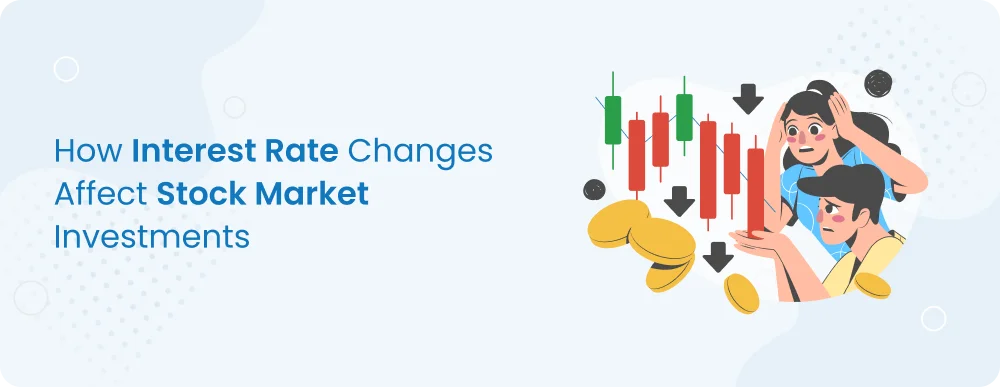How Interest Rate Changes affect stock market investments
Noor Kaur
18 Oct 2024Tags:
Featured
Interest rate fluctuations are among the most significant factors influencing stock market investments. Whether the interest rate increases or decreases, such changes can drastically affect stock prices.
Whether you're a seasoned investor or just dipping your toes in the share market, understanding how market interest rates affect the market is key to making smarter investment decisions.
Understanding Interest Rates and Their Impact on Stocks
First things first: what is the interest rate? Simply put, it represents the cost of borrowing money. Central banks set these rates and adjust them based on economic conditions. If the economy is booming and inflation is creeping up, the central banks might raise interest rates to cool things down.
On the other hand, if the economy is struggling, the central banks could lower rates to encourage borrowing and spending.
In the context of the stock market, interest rate changes directly influence stock investment. When rates go up, companies' cost of capital increases, which affects their profitability. Similarly, borrowing becomes more affordable when rates go down, potentially leading to business expansions and higher profits.
Therefore, market participants keenly monitor interest rate changes to predict their effect on stock market prices.
How do Rising Interest Rates Influence Stock Prices?
When interest rates rise, stock prices usually decline. Higher borrowing costs increase companies' debt servicing burden, reducing their profitability. As a result, many investors anticipate lower future earnings, prompting them to sell off their holdings and causing share market investment prices to fall.
Additionally, rising rates offer more attractive yields on bonds and other fixed-income investments, making them an appealing alternative to stocks. Investors may shift their funds from the stock market today to safer assets like bonds and fixed deposits, further pushing down stock prices.
Moreover, sectors that rely heavily on borrowing — such as real estate and utilities, are especially vulnerable. Their stock prices are likely to suffer more than those of sectors that rely less on debt financing.
In periods of rising rates, it's common to see a rotation away from growth stocks and toward value stocks or companies with stable cash flows.
The Effect of Lower Interest Rates on Stock Market Performance
When market interest rates are reduced, the opposite effect occurs. Lower rates make borrowing cheaper, encouraging companies to invest in expansion, R&D, and acquisitions. As these companies grow, so do their earnings, leading to higher stock prices. Lower rates also make bonds less attractive due to their lower yields, prompting investors to seek better returns in the stock market.
Growth stocks thrive in low-interest environments, particularly in technology and innovation sectors, because they often rely on borrowed funds for expansion. The increased profitability from reduced interest expenses is reflected in rising stock prices, making these stocks highly desirable during periods of low rates.
Interest Rates and Corporate Earnings: The Connection
Corporate earnings are the backbone of stock market investment performance, and interest rates profoundly influence a company's bottom line. When interest rates increase, companies with significant debt face higher interest payments, cutting their profits. Rising borrowing costs can result in project delays or cancellations for companies with large-scale investments in capital-intensive projects, leading to diminished growth potential and reduced stock valuations.
Conversely, during periods of low interest rates, companies with heavy debt loads benefit from lower interest payments, which boosts their earnings. This increase in profitability often leads to increased investor confidence, pushing its stock prices higher.
Corporate performance also influences the overall economy. A robust corporate earnings season typically results in a positive sentiment across the share market investment landscape, and investors pour their money into stocks, expecting further gains.
Consumer Spending and Its Impact on the Stock Market
Consumer spending plays a vital role in influencing stock market prices, especially in sectors like retail, automotive, and technology. When low interest rates, consumers can borrow more cheaply, leading to higher disposable income and increased spending on goods and services. This rise in consumer spending boosts the earnings of businesses, driving their stock prices higher.
In contrast, when interest rates rise, consumers face higher costs for mortgages, car loans, and credit cards, reducing their disposable income. As spending contracts, it negatively impacts their stock prices.
The stock market today is highly reactive to changes in consumer spending, reflecting the health of the overall economy. Investors often view consumer sentiment and spending trends as leading indicators for future stock investment opportunities.
Strategies for Investing in a Changing Interest Rate Environment
Interest rate fluctuations can present both risks and opportunities for investors. To navigate this volatile landscape, investors can employ several strategies:
- Diversification: Spreading investments across different sectors and asset classes, such as bonds, stocks, and real estate, can help reduce risk during interest rate changes.
- Focus on Value Stocks: In periods of rising rates, value stocks with strong fundamentals and consistent earnings become more attractive as they tend to be less sensitive to rising borrowing costs.
- Dividend-Paying Stocks: Companies that pay steady dividends can provide reliable returns even in times of rising interest rates, offering a cushion against falling stock prices.
- Bond Investments: Short-term bonds can be advantageous in a rising rate environment, as they are less sensitive to interest rate changes than long-term bonds.
- Hedging with Financial Instruments: Investors can use options or other derivatives to hedge against adverse movements in interest rates, protecting their portfolios from potential losses.
By adopting these strategies, investors can better manage the impact of interest rate changes on their share market investment portfolios.
Historical Examples of Interest Rate Changes and Market Reactions
History offers valuable lessons on how market interest rates affect the stock market. One notable example occurred during the early 1980s when the Federal Reserve, under Paul Volcker, raised interest rates to combat runaway inflation. The result was a severe downturn in the stock market, as companies faced high borrowing costs and reduced profitability.
Another example is the 2008 financial crisis. In response to the global recession, central banks around the world slashed interest rates to historic lows, providing liquidity to the markets. This policy led to a decade-long bull market in stocks, with major indices reaching all-time highs.
Most recently, during the COVID-19 pandemic, central banks once again lowered interest rates to near-zero levels to stimulate economic activity. The stock market rebounded sharply, particularly in sectors like technology and healthcare, which benefited from low borrowing costs and increased consumer demand.
These historical examples underscore the profound impact of interest rate changes on stock market performance, offering investors insights into anticipating future market movements.
Conclusion
Interest rates are among the most influential factors affecting the stock market. Whether rates are rising or falling, their effects on corporate earnings, consumer spending, and investment strategies are far-reaching. Understanding how changes in interest rates affect the stock market today allows investors to make informed decisions, manage risk, and capitalise on opportunities.
By staying informed and adopting appropriate investment strategies, investors can navigate interest rate fluctuations and protect their portfolios, ensuring long-term success in share market investment.
FAQs
1. Do stocks go down when interest rates are high?
Yes, stocks tend to decline when interest rates are high because companies' borrowing becomes more expensive, reducing their profitability.
2. What stocks will go up when interest rates go down?
Growth stocks, especially in sectors like technology and innovation, typically perform well when interest rates decrease, as lower borrowing costs enable these companies to expand and invest in growth initiatives.
3. How to profit from rising interest rates?
Investors can profit from rising interest rates by focusing on sectors like financial services, which benefit from higher interest margins, or by investing in short-term bonds and dividend-paying stocks that provide stable income.
4. Who benefits from lower interest rates?
Lower interest rates tend to benefit sectors like real estate, technology, and consumer discretionary, as companies can borrow more cheaply, and consumers have more disposable income to spend on goods and services.
Noor Kaur
18 Oct 2024Related blogs
Sign up to our newsletter !
Share this article on
Recent articles
Tags:
Open a Demat Account in just 15 minutes !

Click on open
account below

Fill out some
basic details

Upload your
documents

Start trading in
24 Hours *
Commonly asked questions
Is Master Capital Services Limited SEBI registered?
Do you have a mobile app for Trading and Finance Management?
What services does mastertrust provide?
What is the minimum investment required to start trading with your company?
Is my personal and financial information secure with your company?
What is your customer support availability?





